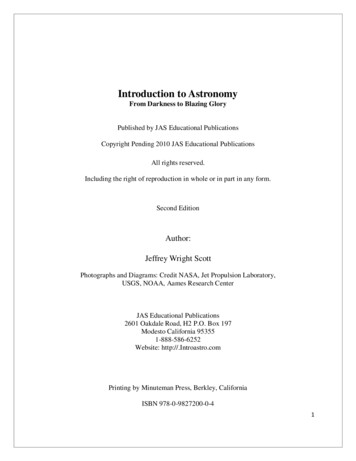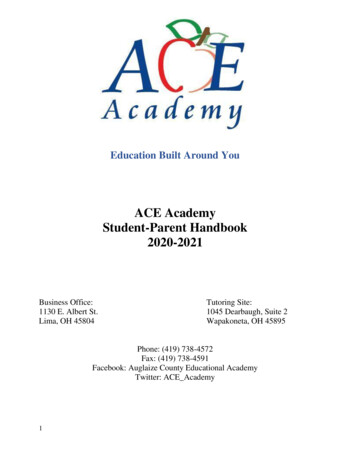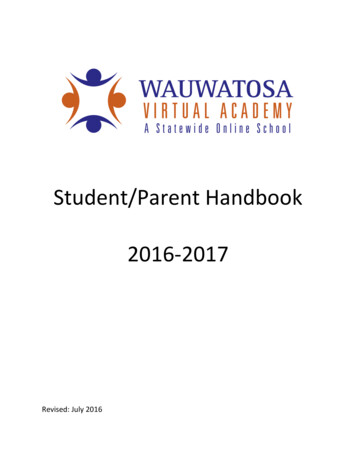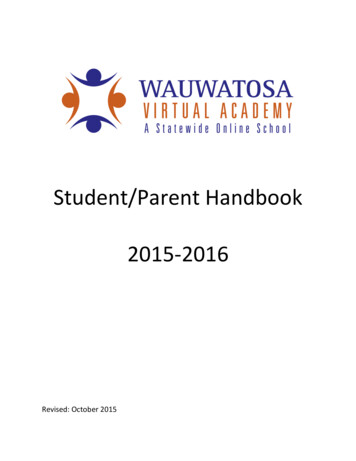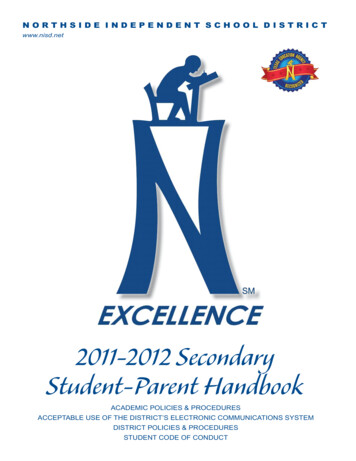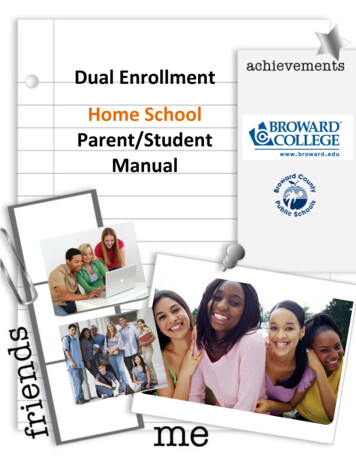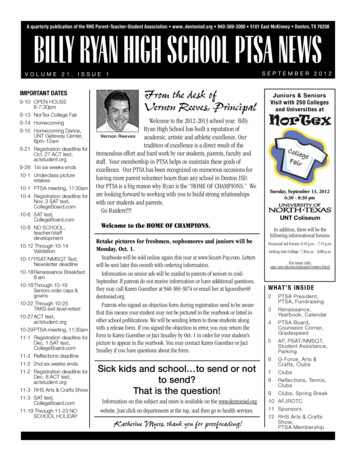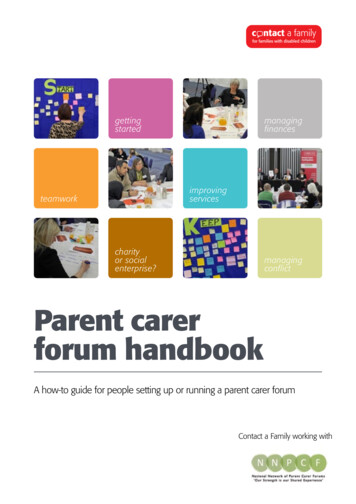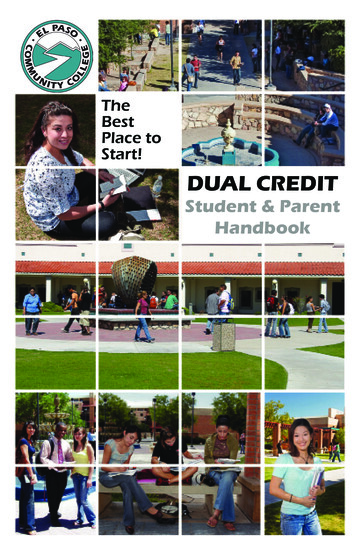
Transcription
TheBestPlace toStart!DUAL CREDITStudent & ParentHandbook1
NOTES2
TABLE OF CONTENTSSection 1 Welcome and IntroductionAbout Dual Credit. 4EPCC Courses and Access to Programs. 4Section 2 Information for StudentsStudent Eligibility. 5Placement Testing/Test Scores for Placement. 6Application/Registration Requirements for Dual Credit. 6Family Education and Right Privacy Act (FERPA). 7Rights of Individuals with Disabilities. 8Specific Criteria for Home-Schooled Students. 8Student Responsibility. 8Student Expectations. 9Attendance Policy. 9Tutorial Assistance. 10Library Resources. 10College Transcripts. 10Withdrawing/Dropping a Course. 10Financial Aid. 11Student Academic Issues. 11Section 3 Information for ParentsExpectations for College. 12Section 4 DefinitionsDefinitions. 13Section 5 Resources and ServicesEPCC Resources and Services for Students.14Section 6 Important Information & WebsitesComplete an EPCC Application. 15How to Access your E-mail Account. 15How to Access Blackboard for Online classes. 16Obtain Catalog, Grades, & Request Transcripts. 16Download Unofficial Transcripts. 17Texas Common Course Numbering System (TCCNS). 17Degree Plan & Degree Evaluation. 18Frequently Asked Dual Credit Questions. 18Section 7 Contact InformationContacts.19Updates will be posted on the Dual Credit Program’s webpage at www.epcc.edu/dualcreditAcademic Year 2015-20163
Section 1 WELCOME! & IntroductionEl Paso Community College (EPCC) warmly welcomes new students andfamilies! We strongly encourage you to be an active participant and takeadvantage of all the services we have to offer you as a Dual Credit student.El Paso Community College staff and faculty are here to serve you and makeyour higher education experience positive and successful.EPCC is the Best Place to Start and Finish!EPCC is proud to collaborate with your local high school to provide youwith the opportunity to experience challenging and high-quality collegecourses while completing your high school requirements. You will be stepsahead after you graduate from high school with newly acquired confidence tosucceed academically in the college of your choice.The Dual Credit Program at EPCC offers you endless possibilities to provideyourself with a stimulating and enlightening college life. The administrators,faculty, and staff at EPCC commend you and welcome you to a new andsuccessful college experience!Work hard and aim high. College is a path to a rewarding future and you arechoosing that path now. We congratulate you as you have set your sites onpursuing higher education. EPCC is here to support you in this very importantjourney!About Dual CreditThe Dual Credit Program provides an opportunity for qualified high schoolstudents to enroll in college-level courses. Students can earn college creditand high school credit at the same time by taking EPCC classes at theirhigh school campus. This experience can significantly increase the student’sprospects for success and graduation from college and/or university and it’sfree!EPCC Courses and Access to ProgramsEPCC welcomes students to research EPCC’s degree plans and the coursesthat are offered at the high school. The choice will benefit students as theycontinue to pursue a college degree. View page 18 for steps on how to downloadEPCC’s Degree Plans.EPCC offers educational and occupational/technical programs as described inthe college catalog to all persons.Admission to these programs is based on college admission requirements andindividual program policies as outlined in the catalog and the Dual CreditHandbook.4
Section 2 Information for StudentsStudent EligibilityEl Paso Community College offers the opportunity for students to enrollin Dual Credit classes at various private, parochial high schools, andIndependent School Districts: Anthony El Paso Sierra Blanca Van Horn Canutillo Fabens Socorro Clint Fort Hancock Tornillo Dell City San Elizario YsletaEligibility Criteria:1. As a condition of participating in the Dual Credit Program, the principal,students and parent/legal guardian must sign a Request for High SchoolEarly Admissions/Dual Credit Program Form (EA) available at www.epcc.edu/dualcredit authorizing EPCC to release assessment scores,grades, and academic progress reports to the high school.2. Students must complete the admissions process and take the EPCCplacement tests and/or provide EPCC-approved additional test scores inmath, reading, and writing, as well as course-specific placement test scoreswhere applicable. Students must also meet program-specific requirements(e.g., immigration status, holds, and placement testing issues). Studentswill be permitted to enroll only in college level courses for which they areeligible (as determined by the current EPCC course placement rules) andmust meet all course prerequisites prior to being included on an EnrollmentRoster Form (ERF).3. Students must maintain a minimum GPA of 2.0 in order to remain inthe program.4. Students pursuing a Career and Technical Level One Certificate areexempt from TSI restrictions on enrollment in courses in the certificate.Students interested in this should contact the Dual Credit Counselor.5.Early Admissions students are eligible to take additional college coursesat night, on weekends and/or in the summer for college credit only. However,they are responsible for paying tuition & purchasing their books. View page 13.Note: Summer enrollment is considered one semester (check with the DualCredit high school contact for summer class enrollment).5
Placement Testing/Test Scores for PlacementPrior to scheduling the Texas Success Initiative Assessment (TSI), allstudents must have completed the Pre-Assessment Activity Module (PAAM).It is an online module required by state law. You will not be allowed to takethe TSI assessment until you have completed the PAAM. Go to www.epcc.eduand click on Prospective Students then Placement Testing.College Readiness TSI Placement ScoresMath350 – 390Reading351 – 390Writing5–8OREssay score of 4 AND multiple choice of 363Contact your high school Dual Credit Counselor forSTAAR End of Course (EOC) or other test scores.Application/Registration Requirements for Dual CreditEPCC’s Dual Credit Office works closely with each high school to ensure studentsmeet all EPCC early admissions requirements for Dual Credit. In collaboration withthe high school, students must complete the following:Application for Admission at www.applytexas.org Early Admission Form (EA), signed by student, parent or guardian, and high schoolprincipal Official copy of student’s current transcript reflecting eligible test scores. (If testscores are not posted, high school must submit test scores) Print and save a copy of the Letter of Acceptance to EPCC Take EPCC’s PAAM and TSI Attend a New Student Orientation (NSO)Once all requirements are met, the Dual Credit Office will enroll the student in thecollege Dual Credit course(s) according to the rosters submitted by the high school.The first point of contact for any questions or concerns regarding your son/daughter’sDual Credit enrollment should be addressed to the high school administration orcontact for resolution.NOTE:* There are no limits on the number of courses per term a student may take,this is contingent on the student meeting eligibility requirements. See page 5.* College developmental level courses are not offered to Dual Credit students.* Financial aid is not available while you are a high school student.6
Family Educational Rights and Privacy Act (FERPA) of 1974FERPA stands for Family Educational Rights and Privacy Act of 1974,as amended; commonly known as FERPA, the Privacy Act or the BuckleyAmendment. It is a federal law designed to protect the privacy of educationalrecords to establish the right of students to inspect and review their educationalrecords and to provide guidelines for the correction of inaccurate andmisleading data through informal and formal hearings.FERPA allows release of specified items but does not require it. Items thatmay be released are called directory information. EPCC has classified thefollowing items as directory information: Student nameStudent addressDate of birthAcademic levelTelephone listingEnrollment status Dates of attendanceMost recent/previous institution(s) attendedMajor, field of study, awards/degrees receivedWeight/height (for members of athletic teams)Participation in officially recognizedactivities and/or sportsStudents currently enrolled may request that all or part of their directoryinformation be withheld from the public by filing a written request at the timeof each registration. Such a request will remain in effect until the studentauthorizes its removal in writing. Release of any additional informationpertaining to student records must be authorized, in writing, by the student,except as authorized under the law. Students have a right to inspect, review,request copies of, and challenge the contents of their educational records.The Family Educational Rights and Privacy Act (FERPA) affords studentscertain rights with respect to their educational records. Students have the rightto: Inspect and review the educational records within 45 days of the day thecollege receives a request for access Request the amendment of the educational records that the student believesis inaccurate or misleading Consent to disclosures of personally identifiable information contained in theeducational records, except to the extent that FERPA authorizes disclosurewithout consent File a complaint with the U.S. Department of Education concerning allegedfailures by the college to comply with FERPAVisit www.epcc.edu/catalog for additional information.7
The Registrar’s Office will help you determine if the information is aneducational record and/or whether it may be disclosed without writtenconsent. To be safe, always think written consent.The Registrar’s Office is the repository of all students’ college records. Thestaff will supply students with information related to their college recordsand refer those students requiring additional assistance to the proper collegeofficial or office. If in doubt whether information may be released, please callthe Registrar’s Office at (915) 831-2150.Visit www.epcc.edu/catalog for additional information.Rights of Individuals with DisabilitiesThe Center for Students with Disabilities (CSD) was established in 1979, incompliance with Section 504 of the Rehabilitation Act of 1973. A personalizedcase management model was established to provide counseling services tostudents who are registered with the CSD.The CSD now serves students with disabilities at all five campus sites: Missiondel Paso, Northwest, Rio Grande, Transmountain and Valle Verde. Eachcampus has an office where students can receive services and meet with acounselor.The CSD provides students, regardless of disability, if qualified, an equalopportunity to complete their educational goal through the provision ofaccommodations based upon their individual disability. For further informationand assistance, contact the CSD at (915) 831-2426.Specific Criteria for Home-Schooled StudentsHome-schooled students must provide documentation consisting of transcriptsand curriculum indicating that the home high school course being replaced bythe college course is required for high school graduation. These documentsmust be submitted to the home-school counselor. For further information call(915) 831-2642.Student ResponsibilityThe instructor is available to answer questions about course materials or classpolicies. If students have any concerns about their performance in the courseor are not sure of an assignment, the student should speak with the instructor.8
Student ExpectationsStudents should remember that a Dual Credit course is a college course in allaspects. Dual Credit students are expected to follow the same curriculum thatis used for on-campus students and their responsibilities are the same. Collegecourses sometimes deal with controversial issues or subject matter that highschool courses may not address, which can provide new challenges for theDual Credit student. Nonetheless, Dual Credit students should be preparedand interact with the instructor as any on campus college student. All collegestudents should expect to invest at least double the time out-of-class as inclass in reading, studying, and preparing for college course assignments.To be successful and to ensure completion in a one-hour class of instruction,a student should spend two hours studying and completing class assignmentsdaily. Students should pay careful attention to their instructor’s system forassigning grades. Often the college grading system is different from thesystem that the high school uses. The instructor’s grading system is coveredin the course syllabus that students receive during the first week of class.If students have questions or concerns in a Dual Credit course, it is theirresponsibility to ask the instructor what they need to improve in order tosucceed in the class.El Paso Community College has established a system of rights andresponsibilities for students collectively known as the “Student Code ofConduct.” It helps to explain students’ rights, responsibilities, grievances, andcomplaints procedures, rules, and regulations for general student behavior,discipline policies, and general guidelines that all students are expected tofollow. Visit www.epcc.edu/catalog for additional information.Attendance PolicyWhile you are a student at EPCC, it is your primary responsibility to attendclasses and complete the coursework to earn a grade. The instructor’sattendance policy is covered in the course syllabus that students receive inthe first week of class; it outlines the topics, test dates, assignments, gradingcriteria for the class, course objectives, instructor’s office location, phonenumber, and scheduled office hours so you can contact the instructor if youhave any questions or concerns. In college, absences are handled differentlythan in high school. Students’ absences due to illness or participation in aschool function may be counted against students. Additionally, studentsshould not expect to receive extra credit for attending class. Visit www.epcc.edu/catalog for additional information.9
Tutorial AssistanceTutorial assistance is available to all students. These services can beaccessed via the EPCC website www.epcc.edu or students can come to anyon-campus tutoring center during scheduled hours.Library ResourcesWhile the resources of the high school library may meet most of theresearch needs of Dual Credit students, students may access the EPCC systemas well. Every EPCC student is given an ID number by the admissions/registraroffice. All students can use this to access the full resources of the EPCC librarydatabases. Students may also come in during regular library hours to any of theEPCC campuses. EPCC is an institution of higher education and the collegelibrary provides materials that support and supplement the educational process;no effort is made to either censor or filter any materials from its collections.College TranscriptThe college credit(s) students receive for successfully completing aDual Credit course will always be part of the student’s permanent collegerecord. Whether it is now or later in life, this credit will be useful to studentsas they continue with their educational endeavors.Withdrawing/Dropping a CourseDual Credit Students must contact the designated high school DualCredit contact before withdrawing from a class. This action will ensure highschool graduation requirements can still be met without the college coursecredit.Students may drop a Dual Credit course and return to a regular highschool course at any time before the EPCC final drop date. It is the responsibilityof the student to verify with the EPCC academic counselor that he/she has beenofficially withdrawn/dropped from a course. Students can find the final dropdate on the syllabus, EPCC website, and/or designated high school contact.If the high school drops a student from a course BEFORE the censusdate (see section 4 for definition), the course will not appear on the collegetranscript. If a student drops a course AFTER the census date, on or beforethe “last day to withdraw,” the course is recorded on the transcript with anassigned grade of “W.”10
Financial AidStudents participating in the Dual Credit Program at El Paso CommunityCollege must have completed at least 67% of the courses taken with at leasta 2.0 cumulative grade point average (equivalent to a “C” grade). Coursesfinished with a grade of F, W, I, NC, I*, or F* are not counted as completed.Students who do not meet above criteria are placed on Financial AidSuspension and may jeopardize Financial Aid eligibility. Visit www.epcc.edu/catalog “Financial Aid/Dual Credit” for additional information.# hrs.enrolled# of hrs.to 615151413131211111099877Student Academic IssuesEPCC Dual Credit Counselor’s role is to support and guide students in thecomprehensive high schools. If a student has a concern with the instructor,they should: Talk to the instructor first to see if a solution can be found.If the student still has a concern, EPCC process encourages the studentto contact the EPCC discipline coordinator managing the course, or theinstructional dean who supervises the dual credit instructor.“Knowledge is Power”Francis Bacon11
Section 3 Information for ParentsCongratulations!El Paso Community College isdelighted that your son/daughter has exhibited a desire totake Dual Credit courses. As a parent, you are transitioningfrom a difficult leadership role to an equally difficult supportrole. We are confident that you will assist your teenager inthis transition by ensuring they take on new responsibilities.Expectations for CollegeWhat is expected of college students varies greatly from what is expected ofhigh school students. Most collegiate coursework requires students to pursuetheir education not only in the classroom, but on their own, either b
EPCC welcomes students to research EPCC’s degree plans and the courses that are offered at the high school. The choice will benefit students as they continue to pursue a college degree. View page 18 for steps on how to download EPCC’s Degree Plans. EPCC offers educat
